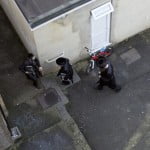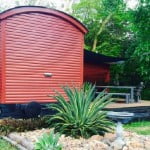HOARDERS, land bankers or Australia’s most generous couple?
The mysterious Wakil family has been given each of these labels in decades of commentary on their multi-million dollar property portfolio, largely made up of empty buildings.
Lefties have slammed Isaac and Susan Wakil’s “wasteful” decision to let properties like Pyrmont’s Terminus Hotel languish, derelict and covered in vines, amid a deepening housing crisis.
The childless Vaucluse couple, aged in their 80s, have long puzzled observers, after disappearing from society without explanation more than two decades ago.
Mr and Mrs Wakil built their early wealth in the garment industry, investing their profits into properties in the neglected suburbs of the 1970s and 1980s.
They were a fixture on Sydney’s A-list social scene, with Mrs Wakil regularly appearing at the Opera House dressed in the finest haute couture.
But the pair became overnight recluses in the 1990s, disappearing from society without explanation and declining all requests for interview.

Pyrmont’s Terminus Hotel, now on the market for $5 million, lay derelict for decades.Source:News Corp Australia
Their silence, and growing frustration over their decision to let buildings on prime Sydney land fall into ruin, prompted housing activists to single them out as scapegoats for the unaffordable rental market.
The pair are understood to be long-term patrons of a number of philanthropic causes, but their secrecy had left them open to the moral outrage that ensues when the wealthy fail to account for their riches.
While they would go on to redeem themselves with an “unprecedented” philanthropic act, for years they were regarded otherwise.
In 2012, a group of anarchists stormed a Wakil family property on Wentworth St, Surry Hills as part of the Occupy Sydney protests.
The rioters hung banners from the empty Griffiths Teas building, which would go on to sell to a developer for $22 million, with slogans including: “New Year’s Eve resolution: Destroy capital before it destroys us.”
An article in radical leftist publication Indymedia crowed that, after the building was “barricaded on the way out”, banners remained hanging three days later.
The activists painted the elderly couple as immorally wealthy villains, having found a scapegoat for society’s woes.
“These superich [sic] [people] are sitting on a bunch of empty buildings, all ripe for the taking,” the article read.

Inside the Terminus Hotel, ‘the pub that time forgot’.Source:News Corp Australia
The sentiment had been brewing for several years, as the cost of housing in Sydney began to bite.
Fairfax Media published an article in 2008 pondering why the Wakils might have decided to leave their buildings empty, when the property market was pushing so many into crisis.
If the link between an empty pub and a lack of residential housing is not immediately apparent, the idea was that these buildings could be converted into residences, hypothetically making housing more available and affordable.
Official figures at the time recorded a spike in the number of empty residential properties, many of them abandoned by mortgage defaulters.
Squatters, of course, took matters into their own hands, moving into a number of vacant properties across Sydney, including commercial buildings owned by the Wakils.

A rare photograph of the Wakils, taken in August 2004. Picture: Justin Lloyd.Source:News Corp Australia
The late Col James, then the director of the Ian Buchan Fell Housing Research Centre at Sydney University, spoke to Fairfax about some potential explanations for the Wakils’ behaviour, including: a long wait for a development application to be approved, a family will dispute (not relevant in this case) or bald-faced greed.
“Some properties are probably vacant for very good reasons but there are others that are left deliberately vacant,” Mr James said.
“Property developers get distinct advantages from the Commonwealth Government like negative gearing to alleviate their tax bill.
“They also get a rental subsidy if they say, ‘We will make this property available for the rental market.’ But they pocket the subsidy, saying, ‘We tried to rent it but we couldn’t’ and then they don’t get the hassle of tenants.”
It is not known whether the Wakils were making use of these subsidies, but one activist blogger claimed in a summary of the family’s landholdings: “Don’t be fooled by the For Lease signs, they’re so old they don’t even have the ‘9’ in front of the phone number which came in around 1994.”
The writer opined: “Next time you hear the words ‘housing shortage’, remember Isaac and Susan Wakil, real estate moguls and pedlars of vacancy”.

‘Pedlars of vacancy’: a Pyrmont owned by the Wakils in 2011.Source:Supplied
In a later Fairfax piece, Real Estate Institute NSW chief executive Tim McKibbin said “land banking” was a common investment method used by developers, but unusual with commercials properties — which could attract an even greater profit.
“That seems to be [The Wakils’s] investment strategy,” Mr McKibbin said.
“I can understand the frustration when people see a building right in the centre of Sydney with all the opportunities that that could actually offer the community, and the owner says ‘I would prefer to leave it vacant’.”
Known for getting around down in a cream-coloured Rolls Royce, the pair ran their Citilease Property Group from the old woolstore building at 100 Harris St, Pyrmont — sold last year to a property developer for $90 million.

supplied photo of Isaac and Susan Wakil who have donated a record amount of money to the Sydney University.Source:Supplied
A Reddit user last year claimed to have worked at the site for a business tenanted to the Wakils, reminiscing that the iconic building had “wool still jammed in some corners”.
“They had some amazing artwork hanging in their office,” Redditer runamuckalot wrote.
“It was 90 per cent empty, with whole floors completely empty, including a massive warehouse basement. They had lots of offers for renters, or the business already inside wanting to move or expand but didn’t allow it.”
‘UNPRECEDENTED’ GIFT
The tide of public opinion appeared to turn in 2014, when the couple suddenly announced plans to sell off $200 million worth of property and donate the proceeds to charity.
When the couple set up the Susan and Isaac Wakil Foundation and began to do just that, they were suddenly elevated to the status of saints.
An “unprecedented” $10.8 million gift to Sydney University’s nursing school last year earned the pair widespread praise, as $1 million gift to the Sydney Jewish Museum.
Mr Wakil was born in Baghdad, while Mrs Wakil fled Romania as a child after her father was imprisoned in a Siberian gulag.
“Susan and I appreciate the valuable work of nurses in the frontline of health care,” Mr Wakil said in a widely quote university press release.
“Regrettably, nurses don’t always get the recognition or headlines they deserve for the critical and very personal care they bring to patients. These new scholarships are a way of supporting the tuition and career development of deserving students and nurses now and into the future.
“Australia is a great country and it’s a good feeling to give something back.”
[SOURCE :-news]




